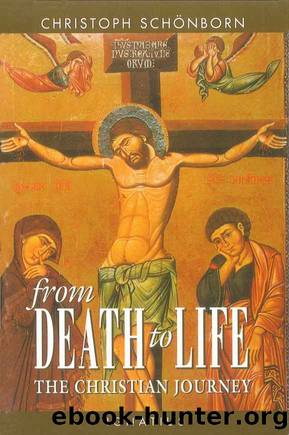From Death to Life: The Christian Journey by Christoph Cardinal Schoenborn

Author:Christoph Cardinal Schoenborn [Schoenborn, Christoph Cardinal]
Language: eng
Format: epub
Tags: Spiritual & Religion
ISBN: 9781681497181
Publisher: Ignatius Press
Published: 2016-07-23T05:00:00+00:00
3. The Kingdom of God, Society, and the Problem of Evil
What we have said up to this point can give the impression that the conflict criticized by Rousseau, which de facto appears again and again, between the heavenly citizenship and the earthly is caused by the clash of two unreconciled and irreconcilable worlds here. Are âChurchâ and âworldâ, civitas Dei and civitas terrena, antagonistic entities, essentially hostile to one another? This tendency has existed again and again in the long history of the doctrine of the two kingdoms.27 Its newest variant, which is still potently effective at the present day, is the view held by the so-called political theology that the Church is something like the âinstitutionalized critique of societyâ.28 We hear also of the âcritically liberating function of the Churchâ in relation to society, giving the impression that a society that is permanently criticized in this way is ultimately a negative entity that must be fundamentally called into question. Indeed, the hallmark of this criticism is that society in all its spheres (economics, culture, defense) is continually told it must have a âbad conscienceâ: not because of particular abuses and wrong attitudes but fundamentally and universally. It is not the abusive practices of banks that are criticized but their very existence; not this or that measure taken in the defense of a country but the very existence of this defense. Behind this criticism, which likes to call itself âpropheticâ, there lies in reality a kind of âpolitical millenarianismâ29 that, in the name of a future âparadisalâ society, rejects and âdemonizesâ the existing society en bloc, demanding that it be overthrown by revolution.
We have presented the relationship between Church and society, between civitas Dei and civitas terrena, up to now as full of tensions. This picture would be onesided if we failed now to add precision by means of a new element: the problem of evil.
Two basic temptations run through the history of the relationship between Church and society, between religion and politics in the West: we can call these, somewhat summarily, the naturalistic and the Manichaean temptations. The latter sees the two entities as mutually hostile by their very nature: the âworldâ is evil, only the âkingdom of lightâ is good, and an implacable conflict exists between these two. Evil is located on one side exclusively: the world, society, politics, etc.; the good lies only on the spiritual, heavenly, or future side. The ânaturalisticâ temptation consists in denying the problem of evil, declaring it to be the âso-called evilâ (Konrad Lorenz), which in reality is nothing other than the play of forces according to the blind necessities of nature, in which there are conquerors and conquered but not good and evil. This is the world-view in which the highest laws are the âstruggle for lifeâ and the âsurvival of the fittestâ. It is the world-view of Darwin and all his disciples, while the âManichaeanâ temptation is that of the Marxist world-view. Jacques Maritain has characterized these two tendencies as typically ârightâ and âleftâ.
Download
This site does not store any files on its server. We only index and link to content provided by other sites. Please contact the content providers to delete copyright contents if any and email us, we'll remove relevant links or contents immediately.
Machine Learning at Scale with H2O by Gregory Keys | David Whiting(4313)
Never by Ken Follett(3955)
Fairy Tale by Stephen King(3396)
Reminders of Him: A Novel by Colleen Hoover(3116)
The Man Who Died Twice by Richard Osman(3078)
Will by Will Smith(2919)
It Starts With Us (It Ends with Us #2) by Colleen Hoover(2367)
Rationality by Steven Pinker(2363)
Can't Hurt Me: Master Your Mind and Defy the Odds - Clean Edition by David Goggins(2341)
Friends, Lovers, and the Big Terrible Thing by Matthew Perry(2230)
The Becoming by Nora Roberts(2201)
The Stranger in the Lifeboat by Mitch Albom(2121)
Love on the Brain by Ali Hazelwood(2075)
New Morning Mercies: A Daily Gospel Devotional by Paul David Tripp(1919)
A Short History of War by Jeremy Black(1848)
HBR's 10 Must Reads 2022 by Harvard Business Review(1844)
The Strength In Our Scars by Bianca Sparacino(1843)
A Game of Thrones (The Illustrated Edition) by George R. R. Martin(1744)
Never Finished: Unshackle Your Mind and Win the War Within by David Goggins(1712)
